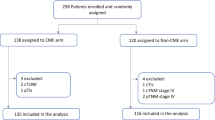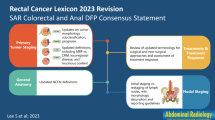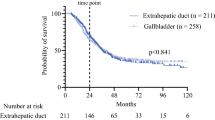Abstract
Background
The objective of this study was to compare long-term oncologic outcomes of robot and laparoscopic surgeries for patients with advanced rectal cancer who underwent neoadjuvant chemoradiotherapy (nCRT) followed by radical resection.
Methods
This study analyzed 3240 rectal cancer patients who underwent radical surgery from 2008 to 2019. Among them, 1204 patients who received nCRT (robotic, n = 316; laparoscopic, n = 888) were analyzed. The oncological outcome according to the number of unfavorable factors (male, body mass index ≥ 25, receiving CCRT) present in patients also was analyzed. We used 1:1 propensity score matching (PSM) to adjust for potential baseline confounders between groups.
Results
After PSM, two groups showed similar demographics and pathological results. After PSM analysis, the robotic group showed higher 5-year disease-free survival (DFS) and local recurrence-free survival rates than the laparoscopic group, whereas 5-year overall survival and distant recurrence-free survival rates were similar between the two groups. In addition, by comparing survival rates for each yp stage, it was found 5-year DFS and local recurrence-free survival of the robotic group in yp stage III were significantly higher than those of the laparoscopic group. Five-year DFS was conducted according to the number of unfavorable factors (male, body mass index ≥ 25 kg/m2, and undergoing nCRT) as a subgroup analysis. In patients with all three unfavorable factors, the robotic group showed significantly higher DFS than the laparoscopic group.
Conclusions
Robotic approach for rectal cancer after nCRT, especially for patients with yp stage III and unfavorable factors, have the advantage of improving oncologic outcomes even for surgeons specializing in colorectal cancer.





Similar content being viewed by others
References
Heald RJ, Husband EM, Ryall RD. The mesorectum in rectal cancer surgery–the clue to pelvic recurrence? Br J Surg. 1982;69(10):613–6.
Heald RJ, Ryall RD. Recurrence and survival after total mesorectal excision for rectal cancer. Lancet. 1986;1(8496):1479–82.
Rickles AS, Dietz DW, Chang GJ, et al. High rate of positive circumferential resection margins following rectal cancer surgery: a call to action. Ann Surg. 2015;262(6):891–8.
van der Pas MH, Haglind E, Cuesta MA, et al. Laparoscopic versus open surgery for rectal cancer (COLOR II): short-term outcomes of a randomised, phase 3 trial. Lancet Oncol. 2013;14(3):210–8.
Kang SB, Park JW, Jeong SY, et al. Open versus laparoscopic surgery for mid or low rectal cancer after neoadjuvant chemoradiotherapy (COREAN trial): short-term outcomes of an open-label randomised controlled trial. Lancet Oncol. 2010;11(7):637–45.
Stevenson AR, Solomon MJ, Lumley JW, et al. Effect of laparoscopic-assisted resection vs open resection on pathological outcomes in rectal cancer: the ALaCaRT randomized clinical trial. JAMA. 2015;314(13):1356–63.
Stevenson ARL, Solomon MJ, Brown CSB, et al. Disease-free survival and local recurrence after laparoscopic-assisted resection or open resection for rectal cancer: the Australasian Laparoscopic Cancer of the Rectum Randomized Clinical Trial. Ann Surg. 2019;269(4):596–602.
Wexner SD, Bergamaschi R, Lacy A, et al. The current status of robotic pelvic surgery: results of a multinational interdisciplinary consensus conference. Surg Endosc. 2009;23(2):438–43.
Kim J, Baek SJ, Kang DW, et al. Robotic resection is a good prognostic factor in rectal cancer compared with laparoscopic resection: long-term survival analysis using propensity score matching. Dis Colon Rectum. 2017;60(3):266–73.
Law WL, Foo DCC. Comparison of short-term and oncologic outcomes of robotic and laparoscopic resection for mid- and distal rectal cancer. Surg Endosc. 2017;31(7):2798–807.
Zhang X, Wei Z, Bie M, Peng X, Chen C. Robot-assisted versus laparoscopic-assisted surgery for colorectal cancer: a meta-analysis. Surg Endosc. 2016;30(12):5601–14.
Lim DR, Bae SU, Hur H, et al. Long-term oncological outcomes of robotic versus laparoscopic total mesorectal excision of mid-low rectal cancer following neoadjuvant chemoradiation therapy. Surg Endosc. 2017;31(4):1728–37.
Feroci F, Vannucchi A, Bianchi PP, et al. Total mesorectal excision for mid and low rectal cancer: Laparoscopic vs robotic surgery. World J Gastroenterol. 2016;22(13):3602–10.
Park SY, Lee SM, Park JS, Kim HJ, Choi GS. Robot surgery shows similar long-term oncologic outcomes as laparoscopic surgery for mid/lower rectal cancer but is beneficial to ypT3/4 after preoperative chemoradiation. Dis Colon Rectum. 2021;64(7):812–21.
Rouanet P, Bertrand MM, Jarlier M, et al. Robotic versus laparoscopic total mesorectal excision for sphincter-saving surgery: results of a single-center series of 400 consecutive patients and perspectives. Ann Surg Oncol. 2018;25(12):3572–9.
Author information
Authors and Affiliations
Corresponding author
Ethics declarations
Disclosures
Drs. Jung Kyong Shin, Hee Cheol Kim, Woo Yong Lee, Seong Hyeon Yun, Yong Beom Cho, Jung Wook Huh, and Yoon Ah Park have no conflicts of interest or financial ties to disclose.
Additional information
Publisher's Note
Springer Nature remains neutral with regard to jurisdictional claims in published maps and institutional affiliations.
Supplementary Information
Below is the link to the electronic supplementary material.
Rights and permissions
Springer Nature or its licensor (e.g. a society or other partner) holds exclusive rights to this article under a publishing agreement with the author(s) or other rightsholder(s); author self-archiving of the accepted manuscript version of this article is solely governed by the terms of such publishing agreement and applicable law.
About this article
Cite this article
Shin, J.K., Kim, H.C., Lee, W.Y. et al. Is Robotic Surgery Beneficial for Rectal Cancer Patients with Unfavorable Characteristic After Neoadjuvant Chemoradiotherapy?. Ann Surg Oncol 31, 3203–3211 (2024). https://doi.org/10.1245/s10434-024-14976-9
Received:
Accepted:
Published:
Issue Date:
DOI: https://doi.org/10.1245/s10434-024-14976-9




